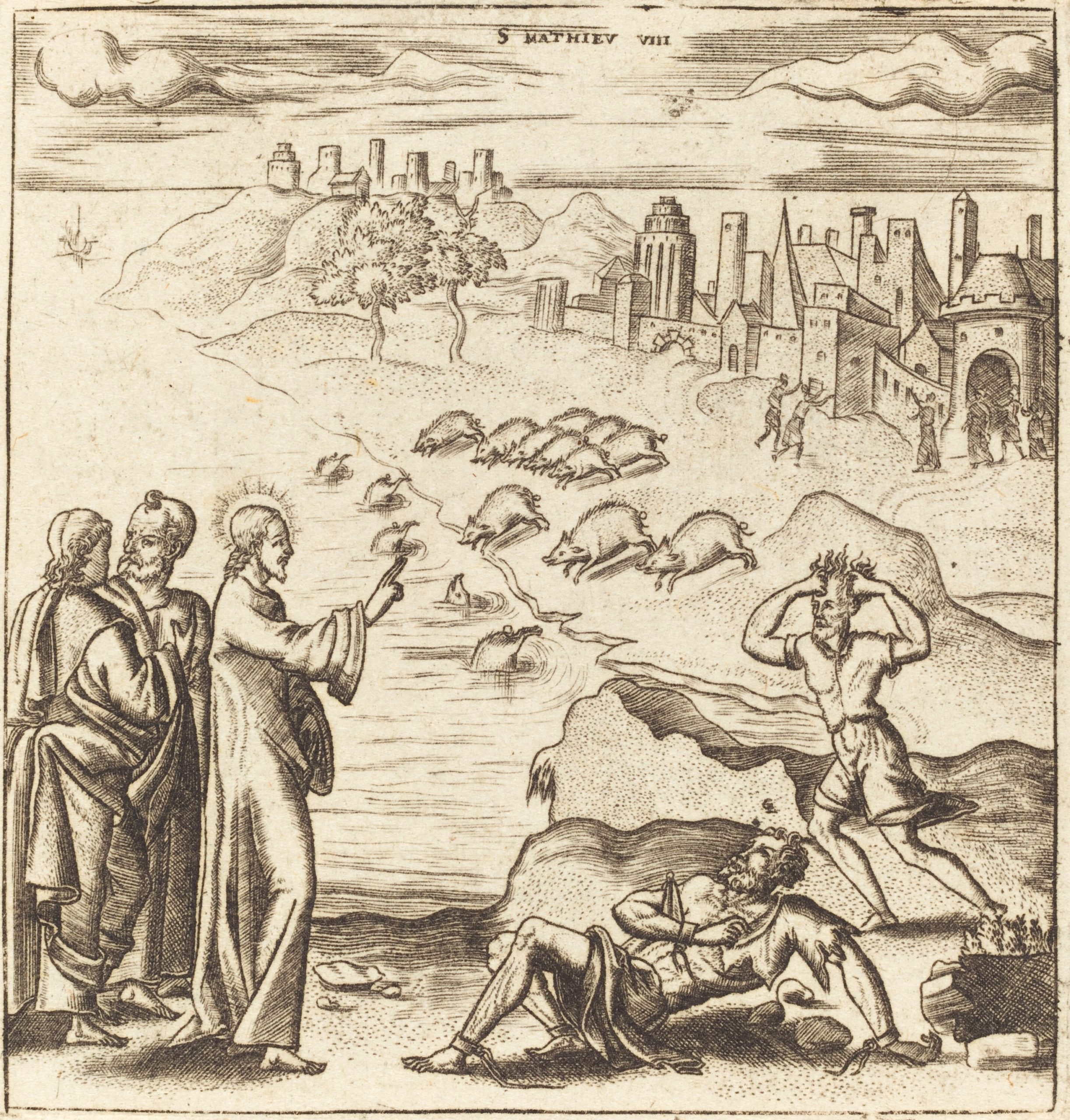June 19, 11:00am – Bishop Visitation and Eucharist.
2022 Sun June 19
The Connection – Sunday, June 19’s Gospel, Juneteenth and World Refugee Day (June 20)
Luke 8:35–39
Image is from
Léonard Gaultier (artist) French, 1561 – 1641, Scenes from the New Testament
Sunday is Juneteenth, the day in 1865 when enslaved people of Galveston, Texas, learned they were emancipated, although it had been the case since 1863. This observance is “about the journey and achievement of African Americans — from a horrific period of sanctioned enslavement to the pinnacle of human endeavors” (Juneteenth.com). So, it is fitting that Sunday’s Gospel (Luke 8:26-39) is about healing and freedom: A man possessed by demons, ostracized and “living in the tombs,” is made whole by Jesus. It’s the drowning pigs story
Today, we tend to understand demons as a metaphor for personal struggles — such as addiction, disease, or chronic illness. But demons can be systemic in society as well, such as our country’s addiction to guns, white supremacy, and income inequality. These societal demons perpetuate the fear that keeps us divided. We see systemic fear of freedom in Sunday’s Gospel as well. The Gerasa community is seized by fear at the man’s healing and restoration, and they banish Jesus, the healer and restorer.
Juneteenth is a time to celebrate what has been done to make our world better for all and reminds us to recommit ourselves to the healing work we need to do before we can all truly be free. It also reminds us to attend to the systemic forces that prevent change, keep oppression in place, and distract us with the falsehood that one person’s freedom must be another person’s loss. As the Rev. Dr. Martin Luther King, Jr. said, “Injustice anywhere is a threat to justice everywhere. We are caught in an inescapable network of mutuality, tied in a single garment of destiny. Whatever affects one directly, affects all indirectly.”—Ruth Frey
Jesus disturbed the comforted and comforted the disturbed – Ryan W. Clayton
The story of the Gerasene demoniac in Luke pushes us to reflect on questions of identity. Immediately preceding this story, Jesus calmed violent wind and raging waves with a word. His disciples ask, “Who then is this, that he commands even the winds and the water, and they obey him?” (Luke 8:25) Who is this, indeed? He masters the storm when the disciples cry out for help, he masters the demons when they cry out to be left alone. Junteenth gave a legal identity to those caught by slavery.
Juneteenth is also related to World Refugee Day.
Junetenth is about personal freedom. World Refugee Day also proclaims the value of each person as a unique child of God and commit ourselves to the healing and wholeness of all persons.
There is a community element as well. As the Bishop of Atlanta writes “God rejoices when we celebrate the truth-that we were made for each other and for God’s glory. “How good and how pleasant it is for brothers and sisters and siblings to dwell together in unity.”
Juneteenth also preserved the integrity of the family by allowing families to stick together without the possibility of being sold. World Refugee Day remembers and honors the families and individuals made homeless by disasters, wars, poverty, and intolerance around the world
World Refugee Day, June 20
“Do not forget to show hospitality to strangers, for by so doing some people have shown hospitality to angels without knowing it.” – Hebrews 13:2
World Refugee Day was established by the United Nations General Assembly in 2000 to honor the contributions of those we do not know, refugees throughout the world, and to raise awareness about the growing refugee crisis in places like Syria and Central Africa and to focus on ways to improve the lives of refugees. It is a day that builds empathy and awareness of the plight of these people.
What is a refugee? Refugee” is a legal term used to define an individual who:
“…owing to well-founded fear of being persecuted for reasons of race, religion, nationality, membership of a particular social group or political opinion, is outside the country of his nationality and is unable or, owing to such fear, is unwilling to avail himself of the protection of that country; or who, not having a nationality and being outside the country of his former habitual residence as a result of such events, is unable or, owing to such fear, is unwilling to return to it.” (1951 Geneva Refugee Convention.)
Many of the characters we know in the Bible were refugees – Adam and Eve, Cain, Noah, Abraham and Sarah, Lot, Hagar and Ishmael, Isaac, Jacob, Esau, Joseph, Moses, Joshua, Naomi, Ruth, David, Elijah, Ezra, Nehemiah, Esther, Mordecai, Jeremiah, Ezekiel, Daniel, Jesus, Peter, John and much of the Early Church.
Scripture supports refugees. “So, show your love for the alien.”- Deuteronomy 10:17-19.
“Be a safe place for those on the run from the killing fields.” Isaiah 16:4
The Old Testament, particularly the first five books, is covered with references to the “stranger”.
An important New Testament passage about strangers is Matthew 25:31-40.” for I was hungry and you gave me food, I was thirsty and you gave me something to drink, I was a stranger and you welcomed me, I was naked and you gave me clothing, I was sick and you took care of me, I was in prison and you visited me”.
Scholars have argued that in the New Testament, “stranger” and “neighbor” are in fact synonymous. Thus, the Golden Rule, “love your neighbor as yourself,” refers not just to people whom you know—your “neighbors” in a conventional sense—but also to people whom you do not know.
Afro-American Histories
Traversing five centuries, multiple continents, and over 130 artworks, the remarkable exhibit reexamines the historical and cultural experiences of Black and African people as told through the histories of the African Diaspora and the transatlantic slave trade.
The exhibit travels through time and across the thematic narratives of maps, enslavements, everyday lives, music, portraits, and resistance, to reveal the lasting legacies of Afro-Atlantic histories and experiences/
5 Fascinating Works from the exhibit
https://news.churchsp.org/sites/default/files/5FascinatingWorksAfro-Atlantic Historiesexhibit.pdf
Coming up – the Solstice on June 21
In 2022, the June solstice occurs on Tuesday, June 21, marking the astronomical first day of summer sy 5:14am
This solstice marks the official beginning of summer in the Northern Hemisphere, occurring when Earth arrives at the point in its orbit where the North Pole is at its maximum tilt (about 23.5 degrees) toward the Sun, resulting in the longest day and shortest night of the calendar year. (By longest “day,” we mean the longest period of sunlight hours.)
In Fredericksburg we will have 14h 49 minutes of daylight from 5:48am to 8:38pm
What is Juneteenth and Why Do We Celebrate on June 19?
Because the Southern Confederacy viewed themselves as an independent nation, the Emancipation Proclamation did not immediately free all of the enslaved population because the Rebel governments would not enforce Lincoln’s proclamation. Texas became a stronghold of Confederate influence in the latter years of the Civil War as the slaveholding population ‘refugeed’ their slave property by migrating to Texas.
Consequently, more than 50,000 enslaved individuals were relocated to Texas, effectively prolonging slavery in a region far from the Civil War’s bloodshed, and out of the reach of freedom—the United States Army. Only after the Union army forced the surrender of Confederate General Edmund Kirby Smith at Galveston on June 2, 1865, would the emancipation of slaves in Texas be addressed and freedom granted. On June 19, 250,000 enslaved people were freed.
The issuing of General Order No. 3 on June 19, 1865, marked an official date of emancipation for the enslaved population. Nonetheless, those affected faced numerous barriers to their freedoms. General Order No. 3 stipulated that former slaves remain at their present homes, were barred from joining the military, and would not be supported in ‘idleness.’ Essentially, the formerly enslaved were granted nothing beyond the title of emancipation. The official end of slavery in the United States came with the ratification of the 13th Amendment in 1865.
After becoming emancipated, many former slaves left Texas in great numbers. Most members of this exodus had the goal of reuniting with lost family members and paving a path to success in postbellum America. This widespread migration of former slaves after June 19 became known as ‘the Scatter.’
Because the Southern Confederacy viewed themselves as an independent nation, the Emancipation Proclamation did not immediately free all of the enslaved population because the Rebel governments would not enforce Lincoln’s proclamation. Texas became a stronghold of Confederate influence in the latter years of the Civil War as the slaveholding population ‘refugeed’ their slave property by migrating to Texas. Consequently, more than 50,000 enslaved individuals were relocated to Texas, effectively prolonging slavery in a region far from the Civil War’s bloodshed, and out of the reach of freedom—the United States Army. Only after the Union army forced the surrender of Confederate General Edmund Kirby Smith at Galveston on June 2, 1865, would the emancipation of slaves in Texas be addressed and freedom granted. On June 19, 250,000 enslaved people were freed.
The issuing of General Order No. 3 on June 19, 1865, marked an official date of emancipation for the enslaved population. Nonetheless, those affected faced numerous barriers to their freedoms. General Order No. 3 stipulated that former slaves remain at their present homes, were barred from joining the military, and would not be supported in ‘idleness.’ Essentially, the formerly enslaved were granted nothing beyond the title of emancipation. The official end of slavery in the United States came with the ratification of the 13th Amendment in 1865.
After becoming emancipated, many former slaves left Texas in great numbers. Most members of this exodus had the goal of reuniting with lost family members and paving a path to success in postbellum America. This widespread migration of former slaves after June 19 became known as ‘the Scatter.’





